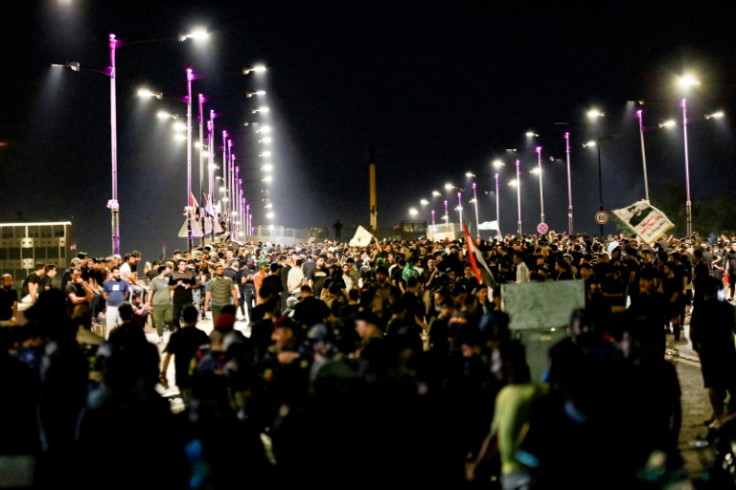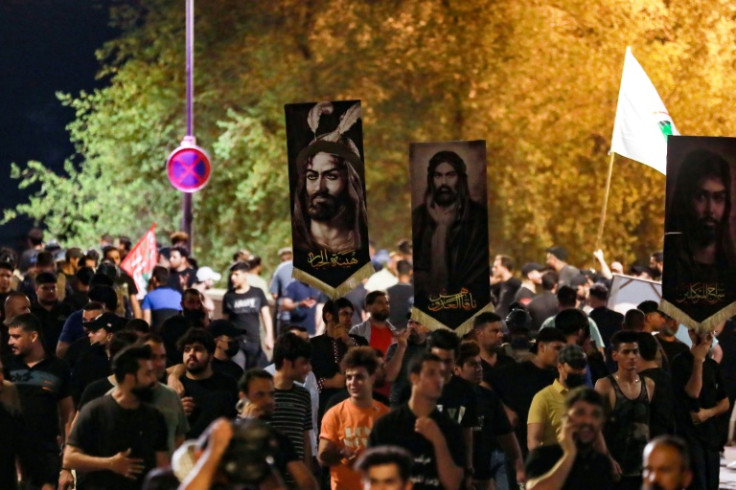Iraqis Keep Up Koran Protests After Book Burnings

Iraqi security forces on Saturday dispersed about 1,000 supporters of Shiite Muslim cleric Moqtada Sadr who tried to march to Baghdad's Green Zone housing foreign embassies, believing a Koran had been desecrated in Denmark.
The protesters were reacting to reports of an apparent desecration of the Muslim holy book for the third time in a month, with the first two in Sweden already raising diplomatic tensions.
On its Facebook page, the extreme right group Danske Patrioter posted on Friday a video of a man burning what seemed to be a Koran and trampling an Iraqi flag.
Copenhagen police deputy chief Trine Fisker told AFP that "not more than a handful" of protesters had gathered Friday across from the Iraqi embassy.
"I can also confirm there was a book burnt. We do not know which book it was," she said. "It was quite peaceful."
Sadr, who has a following of millions among the country's majority Shiite population and wields great influence over national politics, has urged action after Koran desecrations in Sweden.
His followers on Saturday reacted to the news from Copenhagen, and gathered in the pre-dawn darkness at Tahrir Square in central Baghdad, some carrying portraits of Sadr.
"Yes, yes to the Koran!" shouted the protesters, mostly young men.
Security forces cut two bridges leading to the high-security Green Zone where governmental institutions and foreign embassies are located.
The demonstrators tried to force their way through but dispersed several hours later, following scuffles, an interior ministry official told AFP, speaking anonymously because he was not allowed to brief the media.
Another security source said officers used batons and tear gas to repel a small group of demonstrators who managed to break into the Green Zone in an attempt to reach the Danish embassy.
Hundreds of Sadr supporters were already behind the storming and torching of Sweden's embassy in Baghdad early Thursday, over a planned burning of the Muslim holy book in Sweden, weeks after the same protester there lit pages of the Koran.
Early Saturday, Iraq's foreign ministry had condemned "the desecration of the holy Koran and the Iraqi flag" in front of the embassy in Denmark.
The ministry's statement said that "these actions provoke reactions and put all the parties in delicate situations".
A separate statement said "we cannot allow to happen again" what occurred at the Swedish embassy.
It reaffirmed Baghdad's "full commitment" to the Vienna Convention on Diplomatic Relations and said it guarantees "the protection and security provided to diplomatic teams".
The actions of Sweden-based Iraqi refugee Salwan Momika, whose book-burning protest had been permitted by Stockholm on free speech grounds, triggered condemnation across the Muslim world.
Iraq also condemned the attack on Sweden's embassy but expelled Stockholm's ambassador.
Sadr on Saturday said in a vague tweet that "words are no longer enough" in defending religion.
The chameleon-like figure, who has made several reversals of position over the years, in April had said he was "freezing" for a year his movement, though the decision would not affect religious activities.
Last August he said he was retiring from politics.
Hamzeh Hadad, a visiting fellow at the European Council on Foreign Relations think-tank, said Sadr was indirectly challenging his rivals through the Swedish embassy attack.
"This both allows him to show he still posses force & challenge his rivals' credibility among the international community," Hadad wrote on Twitter.
The cleric's supporters had rallied by their hundreds in Baghdad's Sadr City after Friday prayers, chanting support for the Koran. Protests also erupted in Tehran and Lebanon.
The United Arab Emirates summoned Sweden's charge d'affaires on Friday to protest "the repeated attacks and abuses on copies of the holy Koran committed by extremists" in Sweden, the foreign ministry in Abu Dhabi said.
Iran said late Friday it will not allow a new Swedish ambassador into the country.
Supreme leader Ayatollah Ali Khamenei in a statement Saturday called Momika's protest in Sweden "dangerous".
"The severest punishment for the perpetrator of this crime is what all Islamic scholars agree upon," Khamenei added, calling for Momika to stand trial in an Islamic country.
Following the Copenhagen incident, Iran's foreign ministry spokesman Nasser Kanani said: "The Danish government is responsible for preventing insults to the holy Koran and Islamic sanctities, as well as prosecuting and punishing those who insult them."


© Copyright AFP 2024. All rights reserved.







